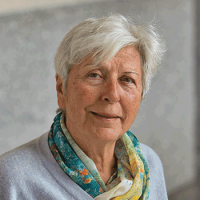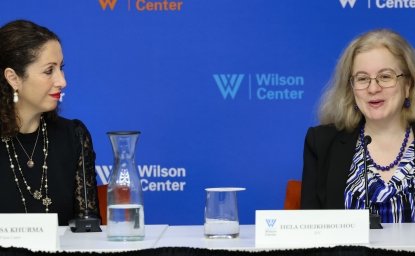The surge of ethnic and sectarian strife in Syria and across the Middle East has led a number of analysts to predict the coming breakup of many Arab states. This potential upending of the region’s territorial order has come to be known as “the end of Sykes-Picot,” a reference to the secret 1916 Anglo-French agreement to divide up the Middle Eastern provinces of the Ottoman Empire into British and French zones of control. Because the European treaties that created new Arab states in the aftermath of World War I upheld the outlines of that agreement, Sykes-Picot became the convenient shorthand for the map that colonial powers imposed on the region, one that has remained essentially constant to the present day.
With bloodshed from Aleppo to Baghdad to Beirut, it is indeed tempting to predict the violent demise of Sykes-Picot. But although the worst fighting is spilling over borders and pushing some countries, such as Syria, toward fragmentation, there is another force crossing national lines and even realigning national relationships: trade. New transnational zones of economic cooperation are making Middle Eastern borders more porous, but in a way that does not directly challenge existing states. Instead, mutual economic interests, especially in the oil and gas industries, may signal a softer end to Sykes-Picot.
This dynamic is most apparent along the border between Turkey and Iraqi Kurdistan, where oil deals in recent years have directly challenged Baghdad’s claims to exclusive control of Iraq’s natural resources and where Turkish and Kurdish leaders have talked trade instead of war. Economic cooperation is emerging as an alternative to political violence elsewhere, too. Cyprus, Greece, and Turkey are discussing shared oil and gas pipelines despite their disagreements. So are Sudan and South Sudan, which have reluctantly accepted the need to cooperate in order to export both countries’ oil after splitting apart in 2011. Economic cooperation is not a cure-all in any of these places. But it does allow states to come together in new ways rather than risk falling apart.
LINES IN THE SAND
The Arab states that emerged after World War I have always struggled with their heterogeneous populations, uncertain national identities, and deep internal fissures. They have existed for almost a century, and vested interests have developed around the preservation of their national borders and institutions. But ethnic, sectarian, and tribal divisions still linger, as conflicts in Iraq, Lebanon, Libya, Syria, and Yemen so clearly demonstrate.
Those divisions are starkest in Syria, where Damascus has lost control over large swaths of its territory since civil war broke out following President Bashar al-Assad’s brutal suppression of peaceful protests in March 2011. Syria’s Kurds have declared their own autonomous region in the northeast. A number of radical Islamist groups fighting the government have seized much of the country’s east and proclaimed their dreams of building a Sunni Islamist state, governed by Islamic law, that would control parts of Syria and Iraq. Some observers even speculate that the Alawites, the esoteric offshoot of Shiite Islam to which Assad belongs, will seek to develop their own rump state along the Mediterranean coast, under the protection of Hezbollah, Iran, and Russia, reviving a statelet that existed under the French mandate during the 1920s and 1930s.
Syria’s Arab neighbors have problems of their own. Lebanon has remained bitterly divided along sectarian and religious lines ever since its brutal 1975–90 civil war. Iraq was nearly torn apart by suicide bombings and sectarian militias after the 2003 U.S. invasion, and the violence has spiked recently, particularly in Anbar Province. Less dramatic but still important, Jordan maintains an uneasy balance between its native population and Palestinian refugees, the latter of which have long made up the majority of the country’s population.
But something else is happening in Iraqi Kurdistan. This semiautonomous region has achieved new prosperity through cross-border economic cooperation, which other enclaves and even countries in the region could seek to emulate. Iraqi Kurdistan has enjoyed de facto self-government since 1991, when the United States imposed a no-fly zone in northern Iraq following the first Gulf War. That alone makes it an exception in the Middle East, along with its ethnic distinction from the rest of the Arab world. U.S. protection could have encouraged Kurdistan to declare its independence from Iraq, upsetting the existing territorial order. Instead, the Kurds chose to pursue their own economic interests within that order.
After the 2003 invasion, Iraqi Kurdistan welcomed the U.S. military occupation, and before long, it was a direct beneficiary. Iraq’s new constitution, passed in 2005, confirmed Kurdistan’s special status by creating a federal system that granted the Kurdistan Regional Government (KRG), based in the city of Erbil, a large degree of self-rule over the provinces of Dohuk, Erbil, and Sulaymaniyah. It also gave Iraq’s 15 other provinces the option of attaining similar status. Yet despite the federal system enshrined in Iraq’s constitution, Baghdad has still done everything it can to curb Kurdish autonomy and to prevent other provinces from demanding autonomy as well.
The bone of contention between Baghdad and Erbil is control over the region’s oil and gas. Baghdad insists that all oil revenue must flow to the central government, which will then distribute it to Kurdistan’s three provinces and Iraq’s other provinces. On the basis of its population, Kurdistan is supposed to receive 17 percent of Iraq’s total oil revenue. But the KRG contends that after Baghdad deducts payments to oil companies and Kurdistan’s share of the country’s expenses for national defense and foreign affairs, Kurdistan receives only 10–11 percent.
The KRG first sought financial independence under Saddam Hussein, signing oil exploration contracts with small energy companies in 2002. But after the enactment of the new constitution, it pushed for deals with more urgency, even though it was unclear whether it had the legal authority to do so. The constitution states that the central government has exclusive control over existing oil fields, but it leaves vague who has jurisdiction over new ones. To this day, the central government asserts its rights over both old and new oil reserves; Erbil claims the right to sign contracts for any new fields in its territory.
The United States tried to settle the dispute between Baghdad and Erbil through a new national hydrocarbon law, but the two sides could not agree. Instead, in 2007, the Kurdish parliament passed its own law regulating oil and gas contracts in the region, permitting generous production-sharing deals with foreign companies.
Dozens of foreign companies, such as the Anglo-Turkish company Genel Energy, China’s Addax Petroleum, France’s Total, Norway’s DNO, and Russia’s Gazprom, rushed in to establish a stake in what Tony Hayward, the former CEO of BP, described in 2011 as “one of the last great oil and gas frontiers.” By 2012, even major U.S. oil companies, such as Chevron and ExxonMobil, had sealed exploration and production agreements directly with Erbil, openly challenging Baghdad -- and the Obama administration, which, despite Washington’s established support for Iraqi Kurdistan, has opposed the deals, fearing that oil disputes within Iraq could threaten the country’s stability. Those major U.S. oil companies joined five smaller U.S. firms -- Hess, HKN, Hunt, Marathon, and Murphy -- and over 40 companies from Canada, China, Norway, Russia, and various Arab and Asian countries in tapping into a Kurdish bonanza estimated by industry experts to amount to 45 billion barrels of oil and 99 trillion to 201 trillion cubic feet of gas.
Despite this windfall, the KRG still needed a way to get Kurdistan’s oil and gas to the international market. Erbil could have pumped it through an existing pipeline -- northern Iraq’s main crude oil export line, connecting the Iraqi city of Kirkuk with the Turkish port of Ceyhan, on the Mediterranean. But Baghdad controls the Iraqi side of that line and would therefore have controlled the oil revenue. So the KRG decided instead to build a new pipeline, from the Taq Taq oil field, in central Kurdistan, to the Turkish border, where it would connect with the Ceyhan line -- a direct challenge to Baghdad’s claim of sole control over Iraq’s oil.
KURDISH BONANZA
The KRG could not go it alone, however; it needed the cooperation of its northern neighbor, Turkey. After some hesitation, the Turkish government agreed to allow the new Kurdish pipeline to link up to its Ceyhan line. But more important, Ankara also agreed to deposit Kurdish oil payments into a Kurdish bank account in Turkey, rather than into Iraq’s national account in New York, where all other Iraqi oil payments go.
The Turkish government’s support of the KRG’s quest for financial independence was a surprising shift, since it had long opposed autonomy for Iraqi Kurdistan as a dangerous precedent given Turkey’s own large Kurdish population, which has ongoing, unsettled, and often violent disputes with Ankara. Turkey had also sought to maintain good relations with both Baghdad and Erbil, but the country needed new, cheap supplies of oil and gas for its rapidly growing economy. Turkey, as its energy minister, Taner Yildiz, said in an interview with an Iraqi Kurdish news agency last December, could not “sit idly by.” Late last year, Kurdistan started shipping oil to Ceyhan, with plans to reach one million barrels a day by the end of 2015. Kurdistan, with its relative security and stability, also represented a far more favorable climate for Turkish businesses than did the rest of Iraq. By 2012, 70 percent of all trade and investment between the two countries was concentrated in Kurdistan, even though its population represents only one-sixth of Iraq’s total.
Not surprisingly, the prospect of Iraqi Kurdistan exporting its own oil to Turkey sparked strong protests from Baghdad. Insisting that it recognized that the oil belonged to all Iraqis, as the constitution states, the KRG promised to pass 83 percent of the revenue on to Baghdad, in keeping with the current revenue-sharing formula developed as part of ongoing budget negotiations. But Kurdish authorities have also made clear that they will deduct from Baghdad’s share the $50 billion in arrears that they claim they are owed. Erbil has also threatened to deduct compensation for damages inflicted on Kurdistan by Saddam prior to 1991, which the KRG estimates at $380 billion. The latter threat is mostly rhetorical; nevertheless, it is clear that Baghdad will not receive its entire 83 percent share anytime soon. The central government could of course retaliate by cutting off all oil payments to Kurdistan. But by the time Kurdish oil exports reach 450,000 barrels a day, perhaps as soon as the end of this year, Kurdistan will be earning enough to replace what it receives from Baghdad, which was $12 billion last year.
Undeterred by Baghdad’s protests, Iraqi Kurdistan and Turkey have continued striking deals and deepening their energy alliance. Last November, Kurdistan’s prime minister, Nechirvan Barzani, and Turkey’s prime minister, Recep Tayyip Erdogan, announced new agreements for the construction of a second oil pipeline to carry Kurdish heavy crude to Ceyhan and a gas pipeline to supply power plants in Turkey. According to leaked reports, Turkey initially plans to buy 353 billion cubic feet of Kurdish gas a year -- and eventually twice that much.
GO YOUR OWN WAY
Cooperation between Ankara and the KRG represents a direct challenge to Baghdad’s hopes of preserving a centrally controlled Iraq. The Kurdish-Turkish pipelines and energy agreements reflect a different vision for Iraq, characterized by strong regional autonomy and permeable boundaries. Of course, the KRG has not been pursuing its economic interests in a vacuum: Baghdad’s demonstrated inability to use its oil revenue to reconstruct Iraq -- severe electricity shortages still plague most of the country -- helped push Erbil to go its own way.
Which vision prevails will have profound implications for the future of Iraq and the wider region. Iraqi Prime Minister Nouri al-Maliki’s attempt to maintain central authority over Iraq’s provinces has reignited ethnic and sectarian violence, which in turn has raised doubts about whether Iraq can hold itself together. Indeed, an effort by Baghdad to block Kurdish-Turkish cooperation could easily backfire, provoking the KRG to declare Kurdistan’s independence.
Ultimately, neither side wants that outcome. Baghdad doesn’t want to lose Kurdistan and its oil, and Kurdistan isn’t ready to face the challenges of independence, including a short-term loss of oil revenue; damage to Kurdish relations with Turkey, which prefers to deal with a semiautonomous region rather than an independent Kurdish state; and a long, costly process of obtaining international recognition. But the standoff hasn’t stopped Baghdad from raising the stakes, withholding funds allocated to Kurdistan in the national budget and threatening lawsuits against the KRG, the Turkish government, and any company helping export Kurdish oil without its permission. The Iraqi oil minister, Abdul-Kareem Luaibi, even told reporters in January that if Turkey facilitates the export of Kurdish oil, “it is meddling in the division of Iraq.” For now, according to Yildiz, more than one million barrels of Kurdish oil sent to Ceyhan since December are being held in storage there until the dispute can be resolved. Time appears to be on the KRG’s side, however. Oil and gas will eventually find their way to market; after all, foreign companies have been drilling in Kurdistan for years without Iraq’s consent.
If Baghdad eventually accepts Kurdistan’s growing financial autonomy and economic cooperation with Turkey, it would amount to a nonviolent but significant weakening of the old Sykes-Picot order. Although the central government would still control much of Iraq’s oil, it would in effect be conceding the fact that a centralized state with rigid borders no longer reflects current economic and political realities. By attracting more foreign investment and exporting more oil and gas, Iraqi Kurdistan would, over time, drift further away from Baghdad.
Baghdad, of course, has good reasons to fear that outcome. Not only does it risk losing control over Kurdish oil, but a thriving, autonomous Kurdistan with close links to foreign states could also become a model for other Iraqi provinces that are unhappy with the central government’s corrupt and authoritarian rule and interested in controlling their own hydrocarbon resources.
Take Nineveh, a northern, Sunni Arab–majority province just west of Erbil. Like most Sunnis, Nineveh’s leaders initially opposed Kurdish autonomy, which they saw as a first step toward national breakup. But the prospect of oil discoveries in their province and the example of Kurdistan are changing their view. Nineveh’s governor, Atheel al-Nujaifi, has spent several years fighting the central government to obtain funds earmarked for his province that are stuck in Baghdad’s bureaucratic maze. Nujaifi would welcome an independent source of revenue. In October 2011, when ExxonMobil signed exploration contracts with the KRG for six oil fields in Kurdistan, two of which are located in a disputed border area with Nineveh, Nujaifi immediately denounced the deal. By June 2012, however, he had changed his tune, arguing that Nineveh should talk directly to ExxonMobil and the KRG about joint exploitation of oil in the contested territory. Nujaifi also argued that Nineveh should follow the lead of its Kurdish neighbors and transform itself into a semiautonomous federal region. Despite a provincial council’s vote earlier this year in favor of this change, Baghdad has blocked the process.
Several other Shiite and Sunni provinces are also considering steps toward autonomy. Shiite-dominated Basra Province, the center of Iraqi oil production, with an estimated 60 percent of the country’s 141 billion barrels of proven oil reserves, has sought to break away from Baghdad since 2008; its provincial council has voted numerous times to press the issue. Anbar, Diyala, and Salahuddin, all Sunni-majority provinces, voted to declare their autonomy from Baghdad in late 2011 and early 2012, but Maliki rejected the calls. Altogether, nearly half of Iraq’s 18 provinces are either already semiautonomous, such as the Kurdish ones, or mulling plans for semiautonomy of their own, in line with the Iraqi constitution.
THE PRIZE
The emergence of transnational zones of economic cooperation as an alternative to state disintegration is not limited to Iraqi Kurdistan and Turkey. As part of Erdogan’s vaunted “zero problems with neighbors” policy, which has taken a hit in recent years (along with the prime minister’s political standing), Turkey’s favorite diplomatic tool has been free trade. Before the 2011 uprising in Syria, Turkey had opened up its border with its southern neighbor, which runs from Syria’s Alawite-dominated Mediterranean coast to its Kurdish northeast. Turkish border towns became shopping centers for Syrians living within driving range of them and transit hubs for Turkish trucks carrying goods to the Gulf. Turkey lifted visa requirements for Jordanian, Lebanese, Moroccan, and Tunisian nationals, and the Turkish and Syrian cabinets held a few joint meetings. Ankara even lined up agreements to set up an ambitious free-trade zone with Jordan, Lebanon, and Syria.
Critics dubbed this policy “neo-Ottomanism,” a veiled attempt by Turkey to restore its old dominance in the Middle East. There was indeed a measure of imperial arrogance to the Turkish plans, and self-interest and a desire for cheap energy have driven Ankara’s policy toward Iraqi Kurdistan. Yet that policy is also a response to the violent ethnic and sectarian forces threatening to destabilize Arab states, where, despite nearly a century of institutionalized borders and national identities, such divisions have never completely gone away.
Even with those hostilities, ethnic and sectarian enclaves could still mimic Iraqi Kurdistan’s solution, seeking autonomy and cooperation within a wider economic zone while remaining nominally within the old national borders. War-torn Syria could follow this model, whenever the fighting stops and Syrians begin to consider how they will live together again. The likelihood of restoring the old, highly centralized Baathist state seems slim, given the pockets of control rebels have established across the country. But the consequences of Syria splintering into nonviable statelets would be dismal. A more promising, federal formula, based on the better parts of Iraq’s constitution, would embrace some kind of autonomy for Kurds in the north, Sunnis in the east, and Alawites along the coast, all of them merged into a cooperative regional economy.
This kind of solution, based on economic cooperation, could also provide a way out of other conflicts in the eastern Mediterranean and North Africa. After decades of failed attempts to resolve disputes between Greece and Turkey over the divided island of Cyprus, signs of hope emerged in 2011 with the discovery of a huge natural gas field in southern Cypriot waters. The cheapest export route would carry the gas through a pipeline from the island’s Greek Cypriot south to its Turkish-administered north, where it would continue on to Turkey and connect with the recently approved Trans-Adriatic Pipeline, which will run through Greece and Albania to Italy. Although Greek Cypriot and Turkish officials are still only discussing the possibility of the Cyprus pipeline, Greece and Turkey are already working together on the Adriatic pipeline despite their long-standing feud over Cyprus, among other issues.
Meanwhile, relations between Sudan and South Sudan remain acrimonious in the aftermath of South Sudan’s independence in 2011 following more than 20 years of civil war -- but the neighbors will have to cooperate over their sizable oil reserves sooner or later. Three-quarters of the two countries’ oil comes from landlocked South Sudan, which depends on Sudan’s pipeline to Port Sudan for export. Unwilling to pay Sudan’s high transit fees, however, South Sudan stopped oil production in January 2012, inflicting enormous economic harm on both countries. But last September, common sense prevailed: the two sides compromised, allowing South Sudanese oil exports to resume and opening up their shared border to the free passage of people and trade.
It is impossible to predict the long-term outcome of the forces threatening the Middle East’s regional order. States wracked by war and infighting, such as Syria, could in fact break up. And states that pursue a cooperative economic agenda aren’t guaranteed success: trade policies and efforts at economic cooperation could fall victim to the same nationalist forces that have driven Arab politics for decades. But the promise of economic associations across borders could limit the possibility of both the restoration of centralized, authoritarian states and states’ violent fragmentation into smaller ethnic or sectarian enclaves.
The United States, for its part, should recognize this new prospect. Washington fears that upsetting the existing territorial order would only breed more conflict and chaos. Although there are good reasons to be alarmed by the nightmare in Syria, trying to prevent territorial change may only encourage more fragmentation -- just the outcome the United States is seeking to avoid. But the oil now traveling across the Kurdish-Turkish frontier represents an alternative: forging new economic zones that straddle borders and transcend old hostilities.
This article first appeared in Foreign Affairs.






